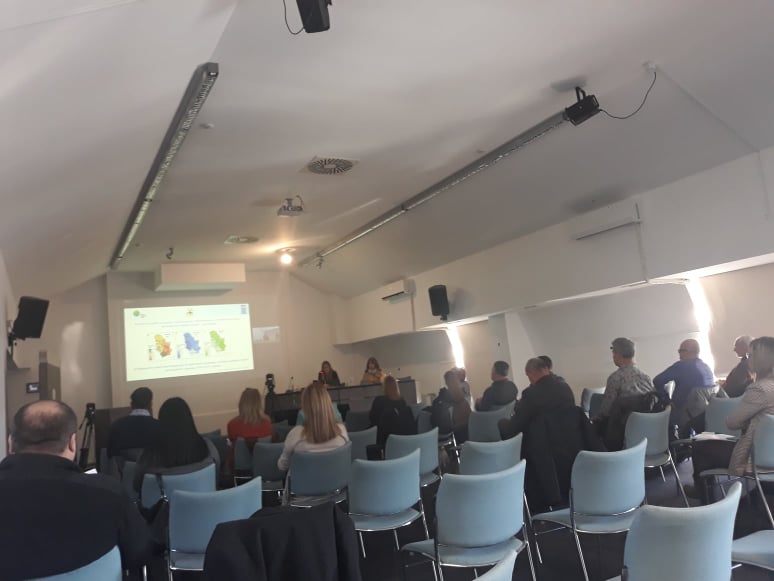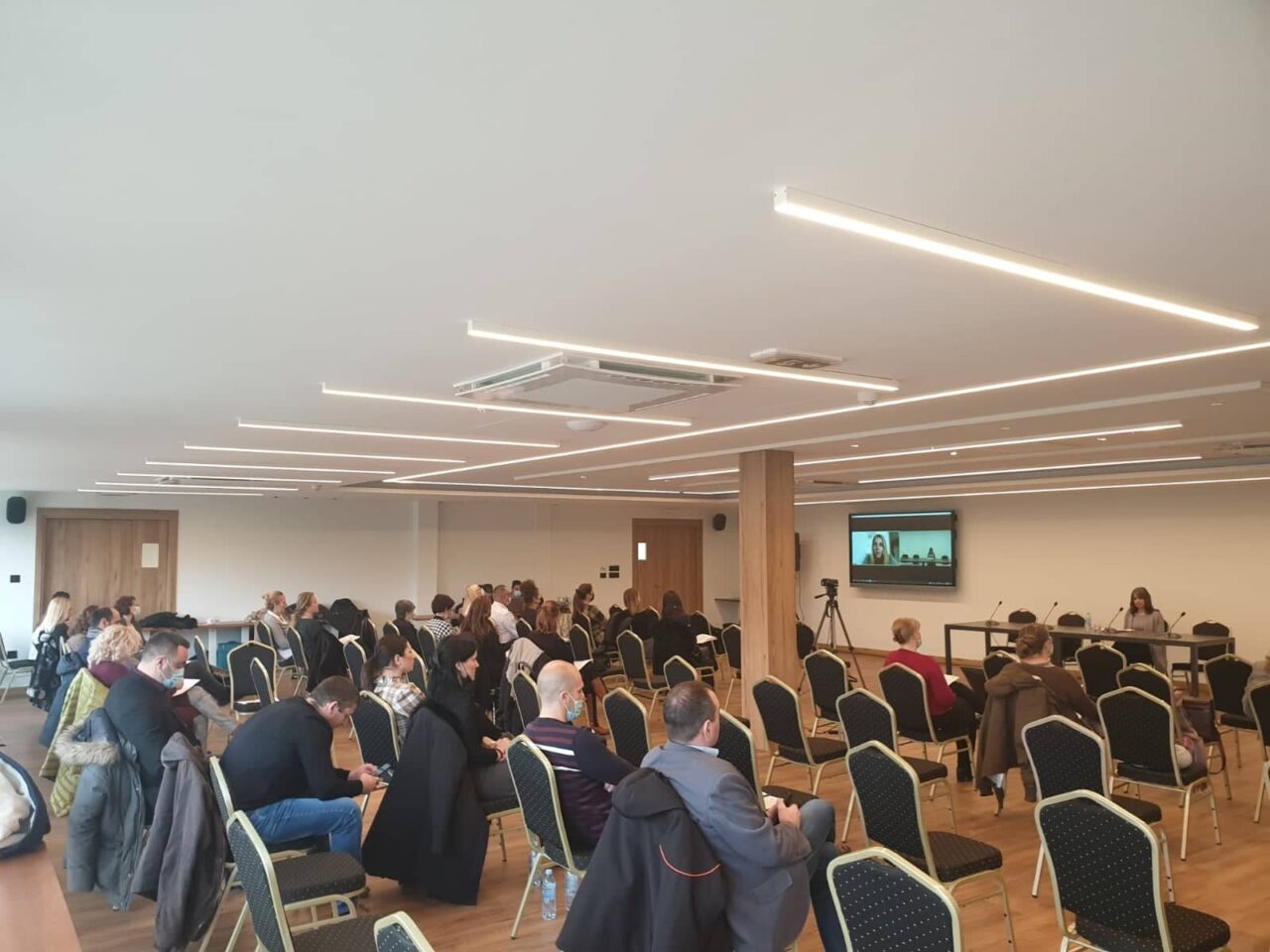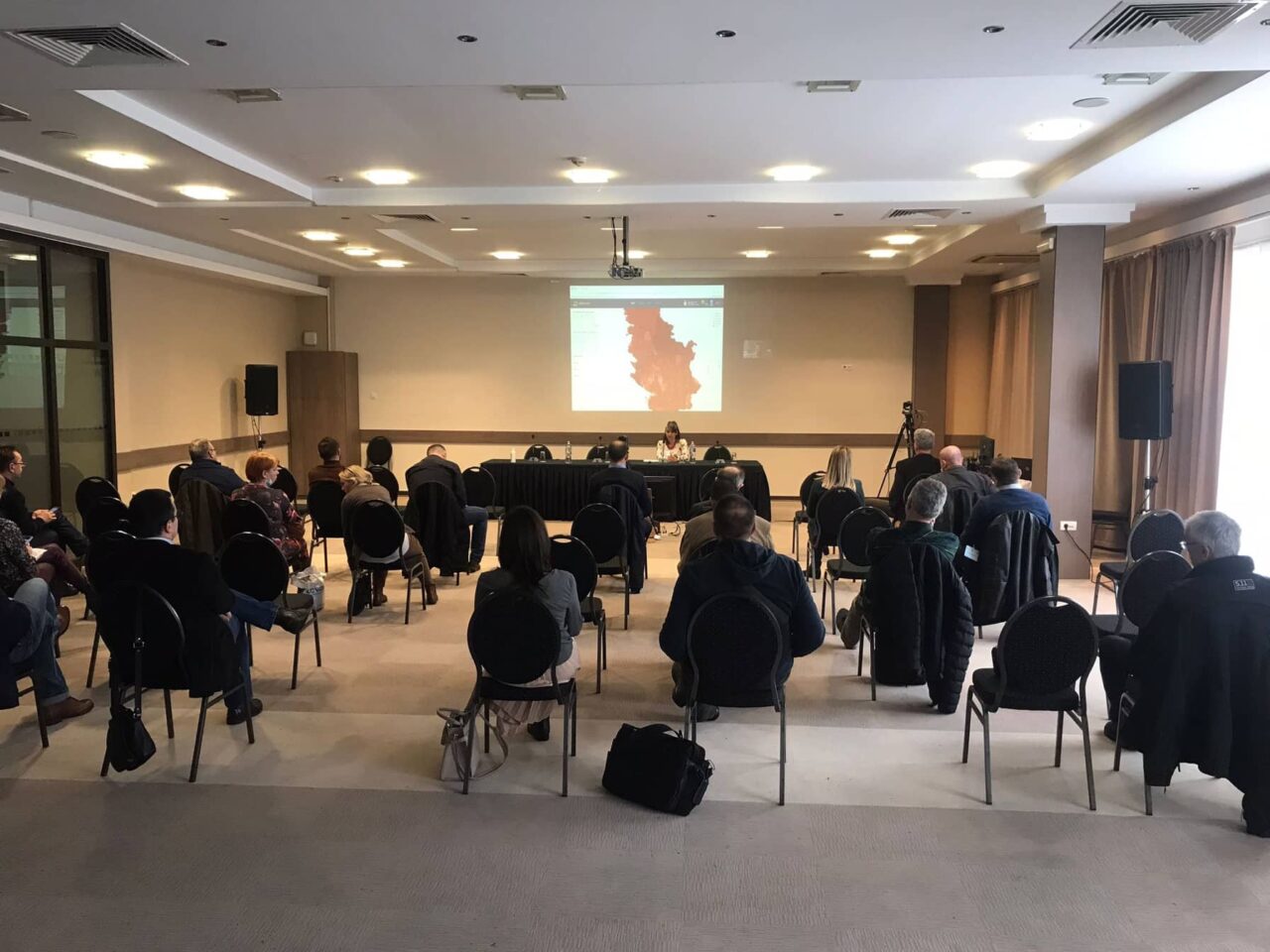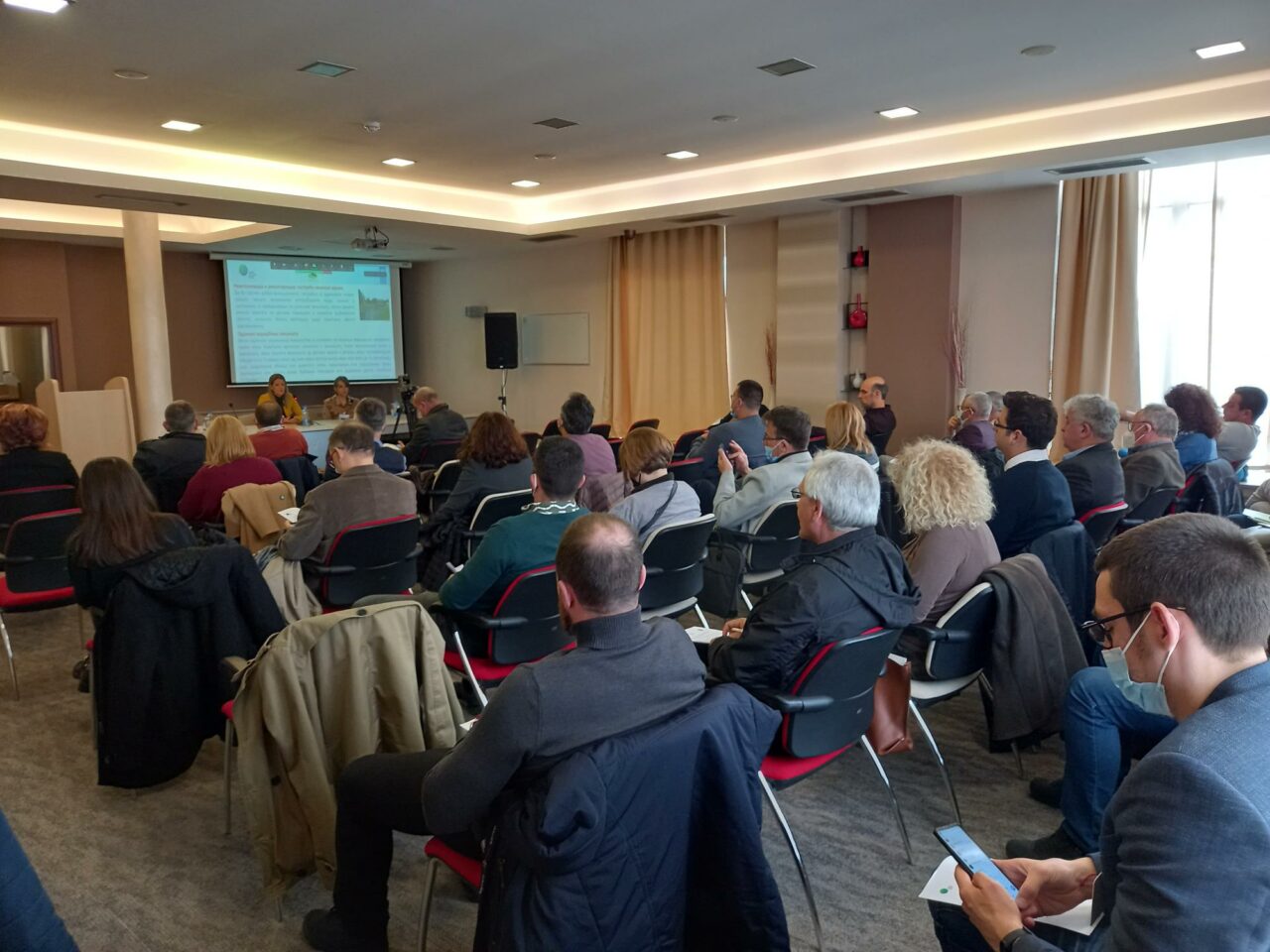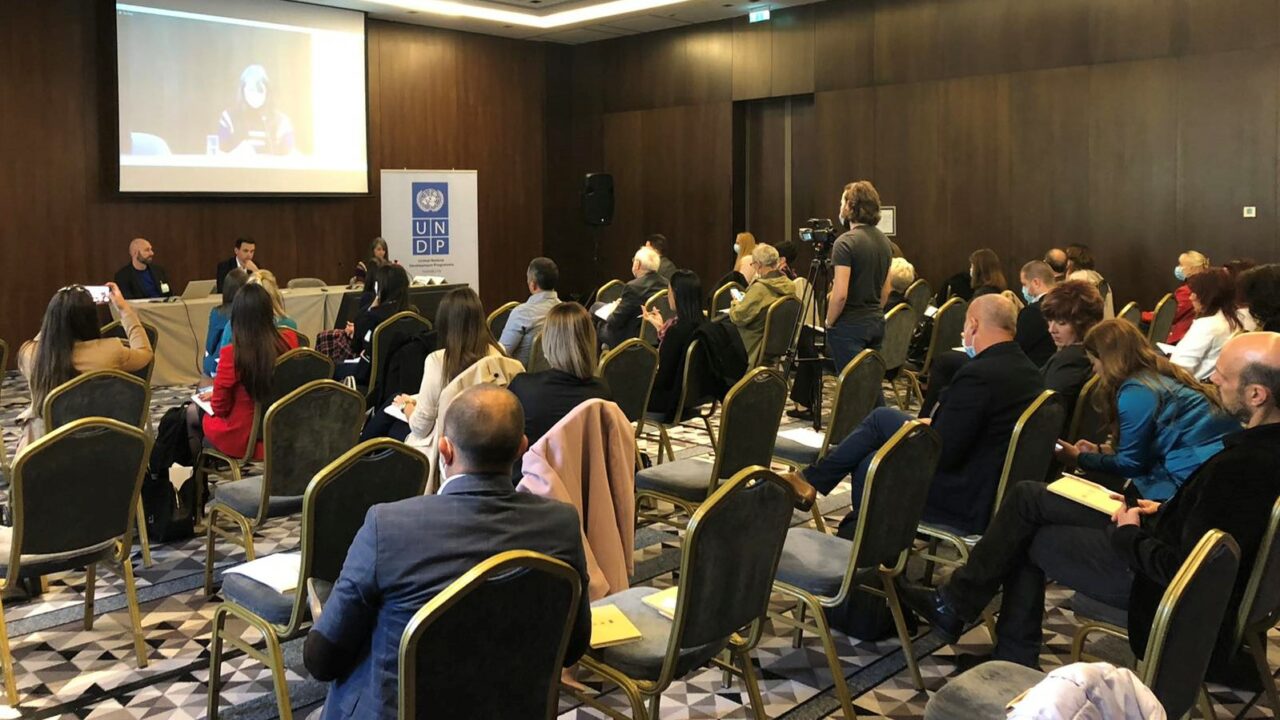-
Dec 15 2021 Zlatibor district very interested in programs of adaptation to climate change in Serbia – a large number of participants exchanged experiences and analyzed necessary measures
The two-day workshop organized by UNDP on Zlatibor on December 8 and 9 have shown that the challenges that accompany climate change are important and that the measures proposed are under the watchful eye of the professional public. Domestic experts, as well as representatives of local governments and bodies dealing with climate change, analyzed papers on climate change and how they can be applied to the sectors of agriculture, water management, energy and infrastructure. In addition to the participants who followed the gathering in the hall, the event was followed by numerous participants from other cities in Serbia via the zoom platform.
At the fifth gathering, which was organized after Belgrade, Nis, Kragujevac and Vrdnik, most attention was paid to activities carried out with national professional, research and scientific institutions, as well as measures aimed at reducing the risk of disasters and natural disasters.
With prevention and adaptation measures based on experiences, good practices and lessons learned at the local government level, the gathering on Zlatibor once again showed how necessary it is to constantly seek the best solutions and to involve all representatives of relevant public companies, agricultural professional services, teachers in agricultural and construction schools, as well as representatives of non-governmental organizations and the private sector.
Attached are presentations from the trainings:
First day of training 8.12.2021.
Potencijal i mogućnosti navodnjavanja u poljoprivredi
Prilagođavanje sektora stočarstva klimatskim promenama
Uticaj klimatskih promena i mere adaptacije u ratarstvu
Uticaj klimatskih promena i mere adaptacije u vinogradarstvu
Uticaj klimatskih promena i mere adaptacije u voćarstvu
Uticaj klimatskih promena na livade i pašnjake i mere adaptacije
Drugi dan
Monitoring, izveštavanje i verifikacija (MRV)
Uticaj klimatskih promena i mere adaptacije od značaja za putnu infrastrukturu
-
Dec 14 2021 And the fourth UNDP workshop on the challenges facing Serbia with climate change exhibition of climate change experts was followed by more than one hundred people
How to best respond to the challenges that Serbia is facing due to the changed conditions of climate change – was the main topic of the two-day workshop organized by the UNDP, held on Fruska Gora on November 30 and December 1. Numerous domestic experts from the United Nations Development Program (UNDP) and the Ministry of Agriculture, Forestry and Water Management presented papers on climate change and analyzed impacts on the agricultural, water management, energy and infrastructure sectors with more than 100 workshop participants. In addition to the participants who followed the gathering in the hall, the event was followed by numerous participants from other cities in Serbia via the zoom platform.
Like the previous three meetings in Belgrade, Nis and Kragujevac, most attention during the presentation and discussion was paid to activities carried out with national professional, research and scientific institutions, as well as measures aimed at reducing the risk of disasters and natural disasters. Special emphasis was placed on prevention and adaptation measures based on experiences, good practices and lessons learned at the local government level.
The event, organized on Fruska Gora, proved to be another excellent gathering of the best experts in the field of climate change, as well as representatives of local governments dealing with agriculture, energy and infrastructure, water management, project preparation, local development and by reducing risk. During the two days, representatives of relevant public companies, agricultural professional services, teachers in agricultural and construction schools, as well as representatives of non-governmental organizations and the private sector joined in the search for the best solutions.
Attached are presentations from the trainings:
First day of training 11.30.2021.
Klimatske promene i smanjenje rizika od katastrofe
Potencijal i mogućnosti navodnjavanja u poljoprivredi
Uticaj klimatskih promena i mere adaptacije u ratarstvu
Uticaj klimatskih promena i mere adaptacije u vinogradarstvu
Uticaj klimatskih promena i mere adaptacije u voćarstvu
Second day of training 1.12.2021.
Monitoring, izveštavanje i verifikacija (MRV)
Uticaj klimatskih promena i mere adaptacije od značaja za putnu infrastrukturu
-
Dec 06 2021 The third training in a row on the topic of adaptation to climate change within the NAP project
In Kragujevac, November 22 and 23, 2021. the third two-day training was held within the project “Improvement of medium and long-term planning of adaptation measures to changed climatic conditions in the Republic of Serbia – NAP project” implemented by the United Nations Development Program (UNDP) in cooperation with the Ministry of Agriculture, Forestry and Water Management. financial support from the Green Climate Fund (GCF). The training entitled “Strengthening the institutional capacity for adaptation to climate change” gathered over 100 participants, including participants present through the zoom platform.
Just before the beginning, the participants were greeted by Miroslav Tadić from UNDP and Milivoje Jovanović from the partner organization ENECE. The first day of the training was opened by Danijela Božanić, climate change expert, who presented the system for monitoring, reporting and verification (MRV) in the field of climate change as well as the accompanying information system with a focus on MRV module in adapting to changed climate conditions, after that, Zdravko Maksimović, Head of the Department for Civil Protection, City of Kraljevo, spoke on the topic of climate change and disaster risk reduction. The discussion on the proposed measures was followed by a continuation where Danijela Božanić also presented the impacts of climate change and adaptation measures in the energy sector, while professors from the Faculty of Civil Engineering, University of Belgrade, Goran Mladenović and Jelena Ćirilović Stanković spoke about the impact of climate change and natural disasters on the road infrastructure. At the very end of the first day of the training, Nikola Vukomanović, a communication expert, presented to the participants how they should send messages and communicate with the public when it comes to climate change.
The second day of the training began with a summary of the first day, which Milivoje Jovanović from ENECA presented to the participants. After that, Professor Vladimir Đurđević, from the Institute of Meteorology, University of Belgrade, presented the NAP web platform to support adaptation planning, while professor Marija Ćosić presented the potentials and possibilities of irrigation in agriculture. Lecturers from the Faculty of Agriculture, University of Belgrade had final presentations on how climate change affects and what are the adaptation measures, namely: for the field of farming, professor Zeljko Dolijanovic, for meadows and pastures, professor Aleksandar Simic and in the field of animal husbandry, professor Dragan Stanojevic.
Like every other time so far, along with the trainings, workshops with journalists continued, who this time had the opportunity to hear more about the impact of climate change and adaptation measures, but also to discuss ways to communicate and send messages to the public. The aim of this workshop is to engage media representatives in raising awareness of the general public about climate change and the need to adapt to changing climate conditions, as well as networking between media representatives and experts in the field of climate change, for future cooperation.
Attached are presentations from the trainings:
- First day of training 22.11.2021.
Klimatske promene i smanjenje rizika od katastrofe
Monitoring, izveštavanje i verifikacija (MRV)
Uticaj klimatskih promena i mere adaptacije od značaja za putnu infrastrukturu
Uticaj promene klime na proizvodnju energije
- Second day of training 23.11.2021.
Potencijal i mogućnosti navodnjavanja u poljoprivredi
Prilagođavanje sektora stočarstva klimatskim promenama
Uticaj klimatskih promena i mere adaptacije u ratarstvu
Uticaj klimatskih promena na livade i pašnjake i mere adaptacije
-
Nov 24 2021 Continuation of training on the topic of adaptation to climate change within the NAP project
In Nis, November 17 and 18, 2021. the second two-day training was held within the project “Improvement of medium-term and long-term planning of adaptation measures to changed climatic conditions in the Republic of Serbia – NAP project” implemented by the United Nations Development Program (UNDP) in cooperation with the Ministry of Agriculture, Forestry and Water Management. financial support from the Green Climate Fund (GCF). The training entitled “Strengthening the institutional capacity for adaptation to climate change” gathered over 100 participants, including participants present through the zoom platform.
Just before the beginning, the participants were greeted by Snezana Ostojic Paunovic from UNDP as well as Milivoje Jovanovic from the partner organization ENECE. The first day of the training was opened by Professor Marija Ćosić, who presented the potentials and possibilities of irrigation in agriculture, while Professor Dejan Đurović presented the impact of climate change and adaptation measures in agriculture. In the continuation, professor Zorica Ranković Vasić spoke about the impact of climate change and adaptation measures in viticulture, while professor Željko Dolijanović did the same for arable farming, professor Aleksandar Simić for meadows and pastures and professor Dragan Stanojević in the field of animal husbandry. All mentioned lecturers / professors are from the Faculty of Agriculture, University of Belgrade.
The second day of training began with a summary of the first day, which Milivoje Jovanović from ENECA presented to the participants. Danijela Božanić, climate change expert, presented the system for monitoring, reporting and verification (MRV) in the field of climate change as well as the accompanying information system with a focus on the MRV module in the field of adaptation to changed climate conditions, followed by Professor Vladimir Đurđević. from the Institute of Meteorology, University of Belgrade, presented the NAP web platform to support adaptation planning. Danijela Božanić also presented the effects of climate change and adaptation measures in the energy sector, while professors from the Faculty of Civil Engineering, University of Belgrade, Goran Mladenović and Jelena Ćirilović Stanković spoke about the impact of climate change and natural disasters on road infrastructure.
During the training with journalists, Nikola Vukomanović, communication expert, presented to the participants how to send messages and communicate with the public when it comes to climate change, and at the very end of the training was Zdravko Maksimović, Head of the Department for Civil Protection, City Kraljeva, who spoke on climate change and disaster risk reduction.
Like the previous ones, this time, along with the trainings, workshops with journalists continued, who this time had the opportunity to hear more about the impact of climate change and adaptation measures, but also to discuss ways to communicate and send messages to the public. The aim of this workshop is to engage media representatives in raising awareness of the general public about climate change and the need to adapt to changing climate conditions, as well as networking between media representatives and experts in the field of climate change, for future cooperation.
Attached are presentations from the trainings:
- First day of training 17/11/2021
- Second day of training 18/11/2021
BROCHURES
-
Oct 22 2021 The first training on the topic of adaptation to climate change within the NAP project
In Belgrade, October 19 and 20, 2021. the first two-day training within the project “Advancing medium and long-term adaptation planning in the Republic of Serbia – NAP project” was held at the Metropol Hotel, implemented by the United Nations Development Program (UNDP) in cooperation with the Ministry of Agriculture and Forestry and water management and with the financial support of the Green Climate Fund (GCF). The training entitled “Strengthening the institutional capacity for adaptation to climate change” has gathered over 100 participants, including participants present through the zoom platform.
Just before the start of the training, 19.10.2021., a meeting of members of the Working Group within the NAP project was held. During the meeting information on achieved results and planned activities within the project was presented. At the very beginning of the meeting, the participants were greeted by Igor Grabež on behalf of the Ministry of Agriculture, Forestry and Water Management, and on behalf of UNDP the speakers were: Tatjana Strahinjić Nikolić, Deputy Team of Leaders for Vital Development, Miroslav Tadić, Program Analyst for Environment and Climate Change. Zorica Korać, portfolio manager, presented the NAP project, achieved results and planned activities, while Danijela Božanić, technical advisor on the project, presented the content of the Climate Change Adaptation Program, as a public policy document.
On the first day of the training, the experts, Ana Vuković Vimić and Mirjam Vujadinović Mandić, from the Faculty of Agriculture, presented the observed and expected climate changes, while Professor Vladimir Đurđević, from the Institute of Meteorology, University of Belgrade, presented the NAP web platform to support adaptation planning. At the very end, lecturers Aleksa Lipovac, Dejan Đurović, Željko Dolijanović, Aleksandar Simić, Dragan Stanojević, Marija Ćosić and Zorica Ranković Vasić, from the Faculty of Agriculture in Belgrade, presented the impact of climate change and adaptation measures in the agricultural sector.
The second day of the training began with a presentation by Danijela Božanić, an expert in the field of climate change and technical advisor on the project, who presented the impact of climate change and adaptation measures in the energy sector. Professor Goran Mladenović from the Faculty of Civil Engineering in Belgrade then presented the impact of climate change and adaptation measures important for road infrastructure, while Zdravko Maksimović, head of the Department of Civil Protection, in City of Kraljevo, spoke on climate change and disaster risk reduction.
Along with the trainings, workshops for journalists continued, that this time had the opportunity to hear more about the impact of climate change on each of the sectors and adaptation measures, as well as to ask questions and discuss with experts on climate change. The aim of the workshop is to engage media representatives in raising awareness of the general public about climate change and the need to adapt to changing climate conditions, as well as networking, for future cooperation, between media representatives and experts in the field of climate change.
Attached are presentations from the trainings:
First day of training 19.10.2021.
– Osmotrene I buduće promene klime
– Uticaj klimatskih promena I mere adaptacije u sektoru poljoprivrede
Second day of training 20.10.2021.
– Uticaj promene klime na proizvodnju energije
– Uticaj promene klime I mere adaptacije na putnu infrastrukturu
– Klimatske promene I smanjenje rizika od katastrofa
Documents
- Report on the Impact of Climate Change on the Forestry Sector, With a Proposal of Adaptation Measures
- Report on the impact of climate change on the AGRICULTURE sector, with proposed adaptation measures*
- Report on the impact of climate change on the AGRICULTURE sector, with proposed adaptation measures
- Report on the Impact of Climate Change on the Forestry Sector, With a Proposal of Adaptation Measures
- Report on the Impact of Climate Change on Road Infrastructure, with a Proposal for Adaptation Measures
- Report on the existing risks and observed vulnerabilities on climate change on the Energy sector, with proposed adaptation measures
- National Adaptation Plan for Serbia: Vectors and Vector-borne Diseases

